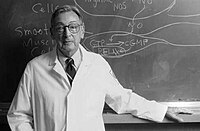Robert F. Furchgott
Robert Francis Furchgott (June 4, 1916 – May 19, 2009) was an American biochemist.
Robert F. Furchgott | |
|---|---|
 | |
| Born | Robert Francis Furchgott June 4, 1916[1] |
| Died | May 19, 2009 (aged 92) |
| Nationality | American |
| Known for | Nobel Prize in Physiology or Medicine in 1998 |
| Scientific career | |
| Fields | Biochemistry |
He discovered a substance in endothelial cells that relaxes blood vessels. He called it endothelium-derived relaxing factor (EDRF). He later worked out EDRF's nature and mechanism of action, and determined that EDRF was nitric oxide (NO), which is an important compound in many aspects of cardiovascular physiology. The research that was done was important in explaining the action of Viagra, treatment of blue babies, and other medical as well as health-related issues. He won the Nobel Prize in Physiology or Medicine in 1998 "for their discoveries concerning nitric oxide as a signalling molecule in the cardiovascular system". He shared the prize with Louis Ignarro and Ferid Murad.[1] He also won a Gairdner Foundation International Award in 1991[2] and a Albert Lasker Award for Basic Medical Research in 1996.[3]
References
change- ↑ 1.0 1.1 1.2 "Robert F. Furchgott - Facts". Nobelprize.org. Retrieved 2014-03-19.
- ↑ "Robert F. Furchgott BS, PhD". The Gairdner Foundation. Archived from the original on 2016-03-06. Retrieved 2014-03-19.
- ↑ "Basic Medical Research Award: Robert Furchgott". The Lasker Foundation. Archived from the original on 2013-10-11. Retrieved 2014-03-19.